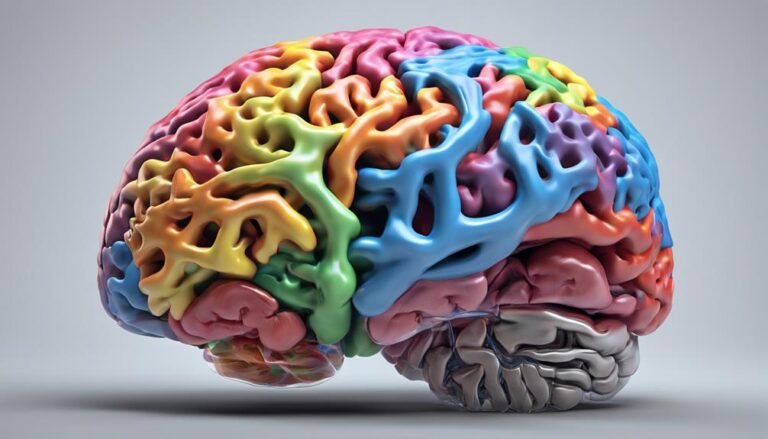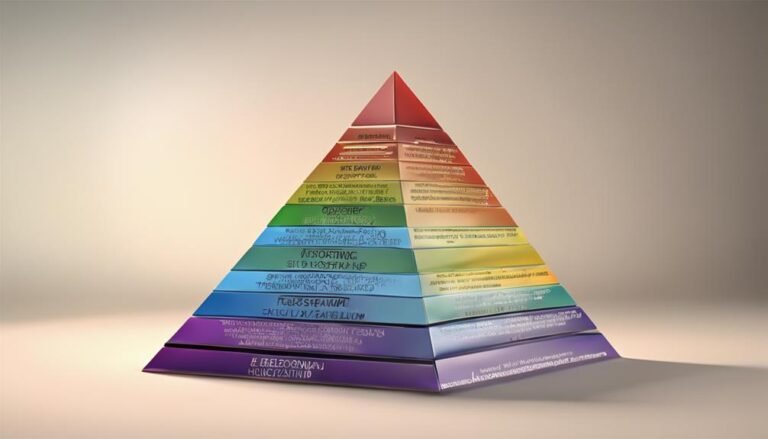Introduction to Personality Assessment
You may not be aware that personality evaluation goes beyond just determining introversion or extroversion. The intricate methods used in evaluating personality traits can provide a deeper understanding of individuals' behaviors and characteristics. As you explore the various tools and techniques employed in this field, you will uncover how these evaluations offer valuable insights into human nature and can be instrumental in personal and professional development. Stay tuned to discover the nuances of personality evaluation and its wide-ranging applications in different spheres of life.
Key Takeaways
- Personality assessment evaluates enduring traits and behaviors.
- Methods include self-report questionnaires, interviews, and projective tests.
- Reliability ensures consistent results, while validity measures accuracy.
- Understanding individual nuances enhances assessment interpretation.
- Applications range from job suitability to personal growth and therapy tracking.
Importance of Personality Assessment
Understanding the significance of personality assessment is essential in various fields to gain insights into individual traits and behaviors. The benefits and applications of personality assessment are vast, aiding in the understanding and development of individuals in different contexts.
In the domain of psychology, personality assessments assist therapists in tailoring treatment plans to suit the unique characteristics of each client. These assessments provide valuable information that can guide interventions and enhance therapeutic outcomes. Additionally, in the field of human resources, personality assessments are utilized during the recruitment process to guarantee a better fit between candidates and job roles, ultimately leading to higher job satisfaction and productivity.
Personality assessments also play an important role in personal development. By understanding one's own personality traits through assessment tools, individuals can identify areas for growth and work towards improving themselves. Furthermore, in educational settings, personality assessments can aid teachers in recognizing different learning styles and adapting their teaching methods to cater to the diverse needs of students.
Key Concepts in Personality Assessment
Personality evaluation in psychology and other fields involves key concepts that serve as foundational principles for evaluating and understanding individual traits and behaviors.
Personality traits are enduring patterns of thoughts, feelings, and behaviors that distinguish individuals from one another. These traits are appraised using various methods to provide insights into an individual's unique characteristics. Evaluation methods include self-report questionnaires, interviews, behavioral observations, and projective tests.
When appraising personality traits, it's essential to take into account the reliability and validity of the assessment tools. Reliability refers to the consistency of results obtained from a measurement tool, while validity refers to the tool's ability to accurately measure what it intends to measure. Understanding these key concepts in personality evaluation ensures that evaluations are accurate and meaningful.
Types of Personality Assessment Tools
Various methods are utilized in personality assessment to gauge individual traits and behaviors accurately. Assessment tools come in various forms, including interviews, observations, and projective tests.
Interviews allow professionals to directly interact with individuals, observing their verbal and non-verbal cues. Observations involve watching individuals in different settings to assess their behaviors.
Projective tests, like the Rorschach inkblot test, aim to uncover unconscious thoughts and feelings based on individuals' interpretations of ambiguous stimuli. While these tools provide valuable insights into personality traits, they also have limitations.
For instance, interviews can be influenced by interviewer bias, observations may not capture the full range of behaviors, and projective tests can be subjective in interpretation. Understanding these limitations is essential for accurate measurement of personality traits, ensuring that assessments are as objective and reliable as possible.
Self-Report Questionnaires
Self-report questionnaires are commonly used in personality assessment to gather individuals' self-perceptions and behaviors. These questionnaires are structured assessments where individuals provide responses to a series of questions about themselves. Test administration is important in guaranteeing the accuracy of the results obtained from self-report questionnaires. Factors such as the clarity of instructions, the environment in which the test is administered, and the individual's understanding of the questions can all impact the validity of the responses.
Response bias is a concern when using self-report questionnaires. It refers to the tendency of individuals to respond in a way that they believe is socially desirable or acceptable, rather than providing genuine responses.
Cultural differences and response styles also play a significant role in self-report questionnaires. Different cultures may have varying norms and values that influence how individuals perceive and respond to the questionnaire items. Understanding these cultural nuances is essential to guarantee the validity and reliability of the assessment results.
Projective Tests and Techniques
When exploring personality assessment, an alternative method to self-report questionnaires is the utilization of projective tests and techniques.
Projective techniques involve presenting ambiguous stimuli to individuals, such as inkblots or incomplete sentences, to evoke responses that reflect underlying thoughts, feelings, and personality traits. These tests rely on the interpretation of these responses by trained professionals to gain insights into an individual's unconscious processes and personality dynamics.
One of the primary challenges associated with projective techniques is the subjective nature of interpretation. Since responses are often open to various explanations, there's a risk of bias or misinterpretation which can impact the validity of the results.
Additionally, the clinical application of projective tests requires specialized training to guarantee accurate and reliable assessments. Despite these interpretive challenges, projective tests can provide valuable information in clinical settings, aiding in the understanding of complex psychological issues and enhancing treatment planning for individuals undergoing therapy.
Reliability and Validity in Assessment
When evaluating personality assessments, it's essential to take into account the reliability and validity of the tools used. Reliability guarantees consistency in measurement, while validity evaluates whether the test measures what it claims to measure.
Understanding the significance of reliability and validity is fundamental in ensuring the accuracy of personality assessments.
Reliability in Assessments
Assessments' reliability refers to the consistency with which the results measure what they're intended to measure. Two key aspects of reliability in assessments are test-retest reliability and inter-rater reliability.
Test-retest reliability assesses the reliability of a test across different administrations. It involves giving the same test to the same group of people at two different points in time to determine if the results are consistent.
Inter-rater reliability, on the other hand, focuses on the consistency of ratings given by different raters evaluating the same assessment. This ensures that the results aren't heavily influenced by the subjective judgment of individual raters.
Reliability is essential in personality assessments as it ensures that the results are dependable and accurate. By establishing reliable assessments, researchers and practitioners can have confidence in the consistency of the results obtained. It allows for meaningful comparisons to be made over time or between different individuals.
High reliability indicates that the assessment is measuring what it's intended to measure consistently, providing a solid foundation for further analysis and interpretation.
Validity in Personality
The validity of personality assessments is essential in ensuring that the results accurately represent the traits being measured. Construct validity examines whether the assessment truly measures the intended psychological constructs or traits. It assesses how well the questions or tasks align with the theoretical framework of the trait being measured.
Predictive validity, on the other hand, determines if the assessment can accurately predict future behavior or outcomes based on the individual's scores. This type of validity is significant in demonstrating the practical utility of personality assessments in various settings, such as predicting job performance or academic success.
Assessment Accuracy Importance
Ensuring the accuracy of assessments is vital in evaluating the reliability and validity of the results obtained. Assessment techniques must be meticulously designed to enhance measurement accuracy. By focusing on individual differences, the nuances in assessment interpretation can be better understood.
Reliability refers to the consistency of measurement, ensuring that the results are stable over time and not influenced by external factors. Validity, on the other hand, assesses whether the test measures what it intends to measure accurately. To achieve high reliability and validity, assessments should be carefully constructed, standardized, and administered consistently.
Incorporating various assessment techniques can provide a more thorough evaluation of personality traits and behaviors. Understanding individual differences in how people respond to assessments is essential for accurate interpretation. By emphasizing measurement accuracy, personality assessments can yield more reliable and valid results, which are essential for making informed decisions in various fields such as psychology, education, and employment.
Applications of Personality Assessment
Utilizing personality assessments in various fields has become increasingly prevalent due to their ability to provide valuable insights into individual characteristics and behaviors.
In the domain of job suitability, these assessments help employers make informed decisions about candidate fit, enhancing the recruitment process. They also aid in tracking therapy progress by enabling therapists to tailor interventions based on clients' personality traits, leading to more effective treatment outcomes.
In terms of relationship dynamics, personality assessments offer a deeper understanding of partners' traits and communication styles, fostering healthier and more fulfilling connections.
Additionally, individuals can use these assessments for personal growth, gaining self-awareness and identifying areas for development. By recognizing their strengths and weaknesses, people can embark on a journey of self-improvement and achieve greater fulfillment in various aspects of life.
Ethical Considerations in Assessment
When considering ethical considerations in personality assessment, it's vital to focus on privacy and accuracy of results. Ensuring that individuals' personal information is handled confidentially is paramount to maintaining trust and respecting their rights.
Additionally, guaranteeing the accuracy of assessment outcomes is essential for making informed decisions based on reliable data.
Privacy in Assessment
Maintaining confidentiality in assessment processes is a fundamental ethical consideration that safeguards the trust and integrity of the results obtained. Data protection and confidentiality concerns are paramount in guaranteeing that the information gathered during personality assessments remains secure and private. Individuals undergoing assessments must trust that their personal data will be handled with the utmost care and discretion.
Assessment professionals have a duty to inform individuals of the limits of confidentiality at the beginning of the assessment process. This includes explaining who'll have access to the assessment results and under what circumstances the information may be shared. It's essential to obtain informed consent from the individual before proceeding with the assessment to ensure transparency and respect for their privacy.
Furthermore, assessment data should be stored securely and only accessible to authorized personnel involved in the evaluation process. Any transmission of assessment results should also be done in a secure manner to prevent unauthorized access.
Accuracy of Results
Ensuring the accuracy of assessment results is an essential ethical consideration in the field of personality assessment. The reliability and validity of measurement techniques are pivotal for obtaining precise and meaningful information about an individual's personality.
Test interpretation plays an important role in deriving accurate insights from assessment tools, emphasizing the significance of trained professionals in analyzing and understanding the results correctly.
Test administration must adhere to standardized protocols to minimize errors and biases that could influence the outcome. Creating a conducive test environment is crucial in ensuring that external factors don't unduly impact the individual's responses, thereby upholding the integrity of the assessment process.
Ethical considerations surrounding the accuracy of results underscore the responsibility of practitioners to maintain objectivity, competence, and confidentiality throughout the assessment process.
Conclusion
In summary, personality assessment is an essential tool in understanding individual traits and behaviors. By utilizing various assessment methods, such as self-report questionnaires and projective tests, one can gain valuable insights into personality.
It's crucial to verify the reliability and validity of assessments to make informed decisions. With applications in psychology, human resources, and education, personality assessment aids in tailored treatment plans, recruitment, and personal growth.
Remember, knowing oneself is the key to unleashing potential.







